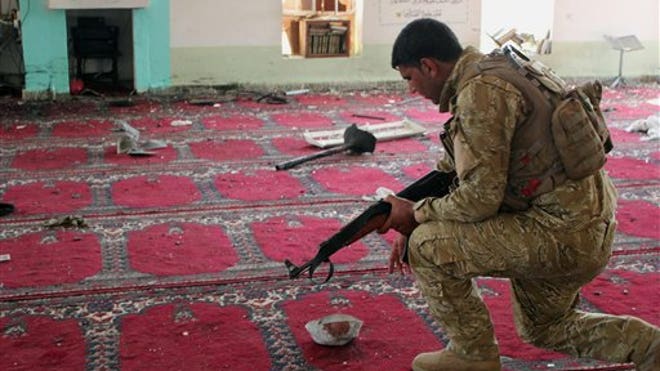Wallahi, those rafidha rats will pay for this. How cowardly, planting a bomb in a mosque during Friday prayers.Bombing at Sunni mosque, other attacks in Iraq kill at least 26
A bomb hidden in an air conditioner that ripped through a Sunni mosque during midday prayers and other attacks killed at least 26 in Iraq on Friday, extending a wave of violence targeting worshippers during the holy month of Ramadan.
Suicide attacks, car bombings and other violence have killed more than 200 people since the Islamic holy month of daytime fasting and charity began last week, according to an Associated Press count.
The violence is an extension of a surge of attacks that has roiled Iraq for months, reviving fears of a return to the widespread sectarian bloodshed that pushed the country to the brink of civil war after the 2003 U.S.-led invasion.
Most of those killed Friday were slain while performing midday prayers in the packed Abu Bakir al-Sideeq mosque in the town of Wijaihiya, which is about 50 miles northeast of Baghdad.
Worshippers and other eyewitnesses said the bomb apparently was planted inside a wall-mounted air conditioning unit to the left of the pulpit. AP television footage of the aftermath showed the interior of the mosque near the bomb site charred black and shrapnel damage peppering the walls. Glass, shoes and other debris littered the blood-soaked red prayer rugs lining the floor.
One of those praying inside, 30-year-old Mohammed Faleh, said the blast struck as male worshippers, including children, were kneeling during communal prayers.
"I stood up to find blood-stained bodies lying on the ground. The Friday prayer turned into a disaster. Whoever left these bombs has no religion," he said.
Faleh said security forces found a second bomb left near the mosque that they rendered safe with a controlled detonation.
Between 250 to 300 people were inside the mosque when the bombing happened, said Sami Dawoud Salman, a member of the local Sahwa, a group of anti-al Qaeda Sunni militiaman that work alongside government security forces. He said the mosque was unguarded and that the local imam had been unsuccessful in getting increased protection.
"I'm asking the government for a solution. There's no security," survivor Jassim Dawoud said. "It's a disastrous situation."
Diyala province, where the attack occurred, was once the site of some of the fiercest fighting between U.S. forces and insurgents in Iraq. It remains a hotbed for terrorist attacks. The area is religiously mixed and witnessed some of the worst atrocities as Shiite militias battled Sunni insurgents for control in the years after the invasion.




